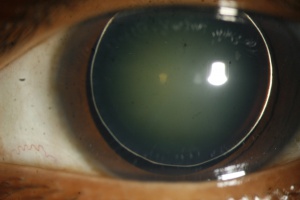Microspherophakia is a rare genetic disorder that affects the lens of the eye. It is characterized by abnormally small and spherical lenses, which can cause various vision problems, including nearsightedness, astigmatism, and glaucoma.
Microspherophakia is caused by a genetic mutation that affects the development of the lens during embryonic growth. The condition is inherited in an autosomal dominant pattern, which means that a child has a 50% chance of inheriting the mutated gene from a parent who carries it.
The symptoms of microspherophakia can vary, depending on the severity of the condition. Common symptoms include nearsightedness, astigmatism, blurred vision, difficulty seeing in low light conditions, and a high risk of developing glaucoma. Some patients may also experience eye pain, redness, and tearing.
Diagnosis of microspherophakia usually involves a comprehensive eye examination. The eye doctor may use specialized equipment, such as a slit lamp or ophthalmoscope, to examine the eye tissues and lens for signs of abnormality. In some cases, an ultrasound or MRI may be performed to assess the size and shape of the lens.
The treatment of microspherophakia depends on the severity of the condition and the symptoms experienced by the patient. In some cases, corrective eyeglasses or contact lenses may be prescribed to improve vision. However, these may not be effective in all cases, especially if the patient has a high degree of nearsightedness or astigmatism.
In some cases, surgery may be necessary to remove the abnormally small lens and replace it with an artificial lens. This procedure is called a lens extraction and intraocular lens implantation. The procedure can improve vision and reduce the risk of developing glaucoma.
Prevention of microspherophakia is challenging, as the condition is inherited in an autosomal dominant pattern. Genetic counseling may be helpful for individuals with a family history of the condition. It is essential to seek medical attention promptly if any symptoms of microspherophakia are present.
In conclusion, microspherophakia is a rare genetic disorder that affects the lens of the eye. It is characterized by abnormally small and spherical lenses, which can cause various vision problems. Early diagnosis and prompt treatment are essential to prevent complications and improve vision. Individuals with a family history of the condition may benefit from genetic counseling.
At The Eye Center- Dr. Mahnaz Naveed Shah & Associates our team of eight ophthalmology subspecialists/ eye specialists, eye surgeons who are considered amongst the very best eye specialists in Karachi and in Pakistan, have the diagnostic and treatment capabilities to treat from the simplest to the most complex patients. We work hard to provide our patients with the best possible medical and surgical eye care, in a state of the art purpose built eye care facility. We offer the entire array of medical, laser and surgical treatments to help provide patients the best possible care in the most efficient, safe and ethical manner.
If you need an appointment, please contact us at 03041119544 during our working hours or leave us a WhatsApp message at +923028291799 and someone will connect with you. Walk-in appointments are also available for emergencies. We can also be reached through our web portal on www.surgicaleyecenter.org


